The choices we make in relation to what we buy impact more than just the bottom line. By choosing products that minimize negative environmental impacts, we can help shift companies, markets, and economies toward behaviors that help protect the natural resources we, and future generations, need to survive. And, when we choose products from companies that demonstrate social responsibility, practice transparency in their operations, and treat their workers fairly, we can help weave the social fabric that creates economic opportunity, promotes connectedness, and provides peace of mind and societal stability. In essence, every time we shop, we’re shaping the world we live in and the one future generations will inherit.
Sustainable Purchasing |
Learn
Auburn University recognizes these connections between what we buy, the planet we live on, and the quality of life humans experience, and has worked with our key suppliers to provide an opportunity for us to act on our values. Through our preferred vendor contracts, the university has been able to secure access, and in many cases discounted prices, for products that meet rigorous, third-party verified sustainability standards. We encourage you to explore, and when possible purchase, products that meet various sustainability standards. In doing so, you’ll be both helping Auburn meet a range of goals, while also contributing to a better tomorrow.
Current Performance
Every three years, Auburn University completes a campus-wide sustainability assessment (STARS), which includes examining our performance in relation to purchasing. Points of evaluation include:
- establishment of sustainability guidelines for business partners;
- completing life cycle cost analyses;
- purchasing from small, minority-owned, and/or local businesses;
- and the percent of total dollars spent in the cleaning products, electronics, and paper categories that are on environmentally-certified products.
During our last assessment, we received 3.29 out of 6 possible points in the purchasing category. Collectively these efforts place us roughly in the middle of the 2nd quartile when compared to other doctoral institutions that have completed the STARS 2.0 assessment.

Purchasing Preferences
In an effort to help conserve resources and improve working conditions, Auburn University prefers the purchase or rental of more sustainable options in relation to cleaning products, electronics, copier paper, and vehicle rentals.
- Cleaning Products
Auburn University prefers the purchase of general cleaning products and janitorial paper products that meet criteria for one or more of the following certification programs: Green Seal, UL ECOLOGO, US EPA Safer Choice, and/or Forest Stewardship Council. To help aide with the procurement of these types of products, the preferred vendor contract with Grainger offers cleaning and janitorial products that meet these standards with on-contract purchasing prices.
- Electronics
Auburn University prefers the purchase of electronics products that meet EPEAT Gold or EPEAT Silver standards. Products eligible to earn EPEAT certification include: desktop computers, notebook/laptop computers, displays, thin clients, tablets, TVs, and imaging equipment. The IT preferred vendor contract with GovConnection offers EPEAT-registered products in the above mentioned categories.
- Paper
Auburn University encourages the purchase of post-consumer waste recycled content copier paper. As such, the office supply preferred vendor contract with Staples offers 30, 50, and 100% recycled-content paper options with on-contract pricing for all campus units.
- Vehicle Rentals
Auburn University travelers are expected to rent Compact or Midsize class vehicles unless sharing the rental with more than 2 other AU business travelers. Rental of sport utility vehicles, minivans, or other kind of specialty vehicles require justification and prior authorization from the PBS travel auditor. Rental of luxury vehicles is not permitted. University travelers are highly encouraged to rent hybrid and fuel efficient vehicles when there is availability.
Common Certifications
When purchasing products and materials for campus, or even at home, you may come across a range of certifications. Being familiar with the various certifications can help you understand a bit more about the product you’re purchasing and can help you avoid paying a premium for wording/labels that exist purely for marketing purposes (aka – greenwashing). The following represent credible certification programs related to sustainability commonly found in the marketplace.
| Certification | Logo | Description | Examples |
|---|---|---|---|
| Greenguard |  | Ensures that a product has met some of the world's most rigorous and comprehensive standards for low emissions of volatile organic compounds (VOCs) into indoor air. | Furniture, flooring, textiles, window treatments, paints/stains, sealants, surface finishes, & other building/construction products |
| Green Seal |  | Certifies products & services to help manufacturers, purchasers, & consumers make environmentally-responsible choices. | Hotels, restaurants, cleaning service providers, paper products, cleaning products, & construction materials/equipment |
| UL Ecologo |  | Multi-attribute certification to ensure the products, service, or packaging reduces negative environmental impacts. | Cleaning products/services, papers, office supplies, electronics, building materials, personal care products, paints/sealants, & electricity |
| US EPA Safer Choice |  | Helps consumers, businesses, & purchasers identify products that perform well & are safer for human health & the environment. | Cleaning & sanitation products |
| Forest Stewardship Council (FSC) |  | Promotes environmentally sound, socially beneficial, & economically prosperous management of the forests. | Wood/bamboo products, paper/pulp products, & cardboard |
| Sustainable Forestry Initiative (SFI) |  | Promotes responsible forest management on all suppliers' lands and throughout the chain of custody. | Wood, paper, print, packaging, & bioenergy |
| Energy Star |  | Helps businesses & individuals save money & protect our climate by rating products with superior energy efficiency. | Appliances, electronics, office equipment, building products, heating/cooling, food service equipment, & lighting |
| EPEAT |  | Environmental performance rating that that address the full product lifecycle, from energy conservation and toxic materials to product longevity and end-of-life management of high-performance electronics | Computers, displays, imaging equipment, TVs, & mobile phones |
| WaterSense |  | Helps consumers find verified water-saving products. | Showerheads, faucets, toilets, urinals, spray-values, & irrigation controls |
| Cradle to Cradle |  | Certifies products based on performance in material health; material reuse; carbon footprint; water management; & social fairness. | Any manufactured product |
| Fair Trade |  | Products that promote safe working conditions, protect the environment, enable transparency, & empower communities. | Apparel, home goods, beans/grains, body care, cocoa, coffee, flowers/plants, fruits/vegetables, herbs/spices, honey, nuts, spirits, sports balls, sugar, tea, & wine |
| Quality Assurance International (QAI) |  | Identifies food products that have been produced in a way that reduces negative environmental impacts. | Whole & processed foods |
| Rainforest Alliance |  | Recognizes products from farms, forests, & businesses that meet rigorous environmental & social standards. | Building materials, flowers/plants, food/beverages, furniture, health/beauty, home/kitchen, instruments, office supplies, printing, & sporting goods |
| USDA Organic |  | Identifies food products that have been produced in a way that reduces negative environmental impacts. | Whole foods & processed foods |
| B Corporation |  | Recognizes businesses based on social & environmental performance, transparency, & legal accountability. | For-profit businesses |
Current Contracts
Auburn University works hard to create mutually-beneficial relationships with key suppliers. These preferred vendors provide key products and services to the university through established contracts and continually work with Payment and Procurement Services to ensure the university’s purchasing needs are met in an effective and efficient way. To help support these relationships and to help achieve our purchasing goals, we’ve provided some how-tos below on finding preferred products with a few of our key vendors.
- Staples
Staples serves as the university’s preferred vendor for office-related supplies. After logging in through the Staples Advantage portal, you can begin adding items to your shopping cart. Start by searching for the type of product you want to purchase. Once you get to the product listings area you can filter for products with sustainability features in a few ways. First, you can click on the small blue arrow underneath the large, bold primary category name and select the related filters. Options other than the top-listed “Pick up in store” include: Eco-Conscious, Minority-Owned Business Enterprise, Recycled, & Women-Owned Business Enterprise. Any of these special filters will help Auburn meet some of its goals related to purchasing. If the above filters are not listed, there isn’t a product available with that option.
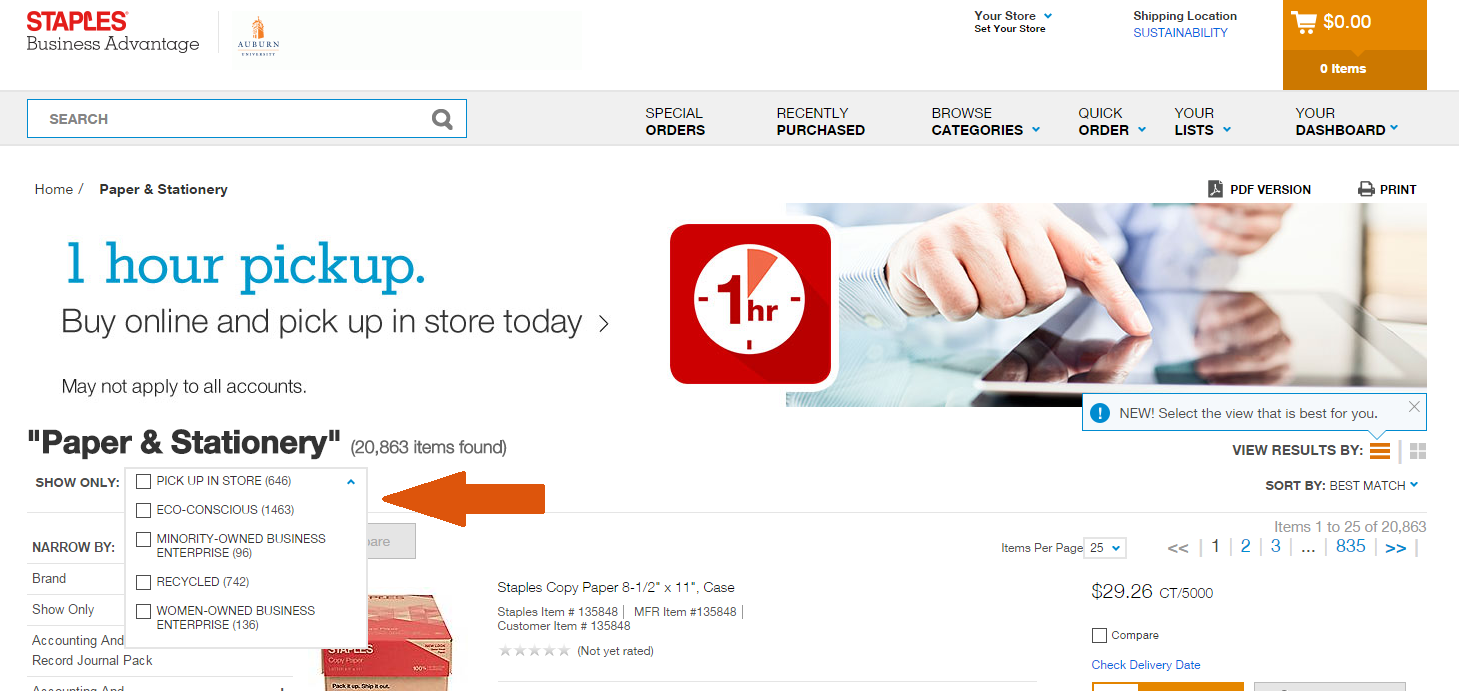
Another way to filter with these same options can be found in the left-hand column on the product listings pages, where they will also appear under the “Show Only” heading.
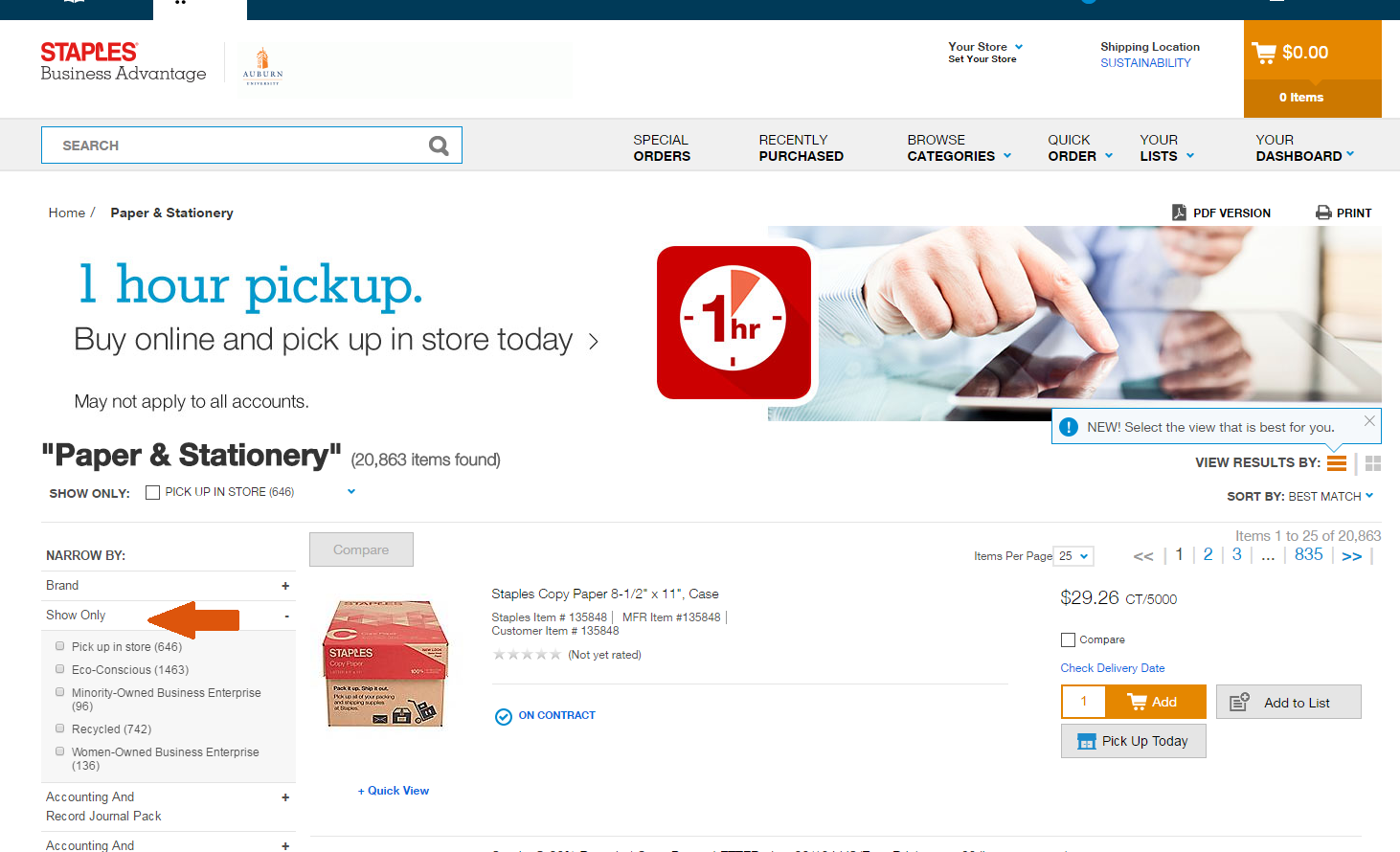
An additional way to filter for these products can also be found by going to the top menu then selecting “Browse Categories,” and then moving to the bottom of the list where you will find the “Eco & Diversity Products” selection. You can then further refine these products through the mini-menu.
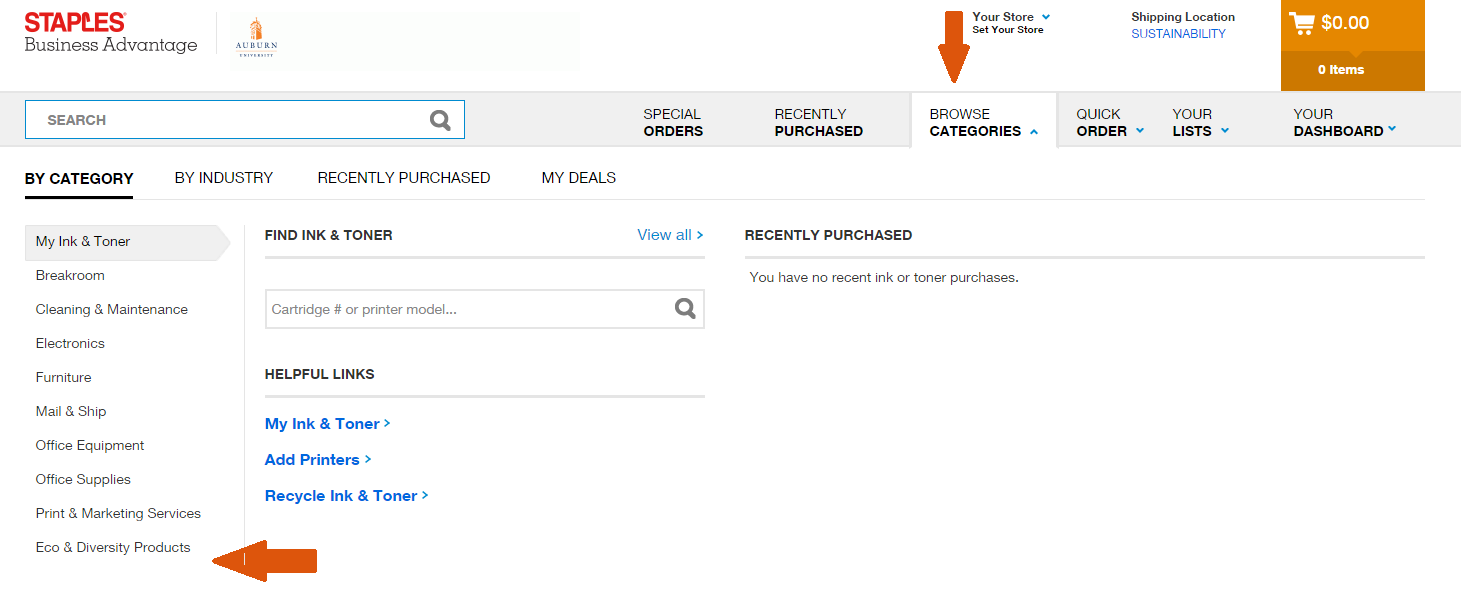
When choosing which item to select, consider selecting items listed as both “on-contract” and that meet Auburn’s stated preference for cleaning, paper, or electronics by achieving the appropriate certifications applicable to the product category (see Purchasing Preferences above).
- Gov Connection
GovConnection functions as the university’s preferred vendor for information technology. Once logged into the GovConnection system, you can filter for products that meet a range of sustainability standards, including EPEAT and EnergyStar.
To filter for these characteristics, navigate to the appropriate product area, and then look in the left-hand column to see if there is an option for “Compliant Standards” . Once you’ve clicked the “+” sign to drop down the menu, simply select the checkbox(es) of the standard(s) you want the product(s) to meet.
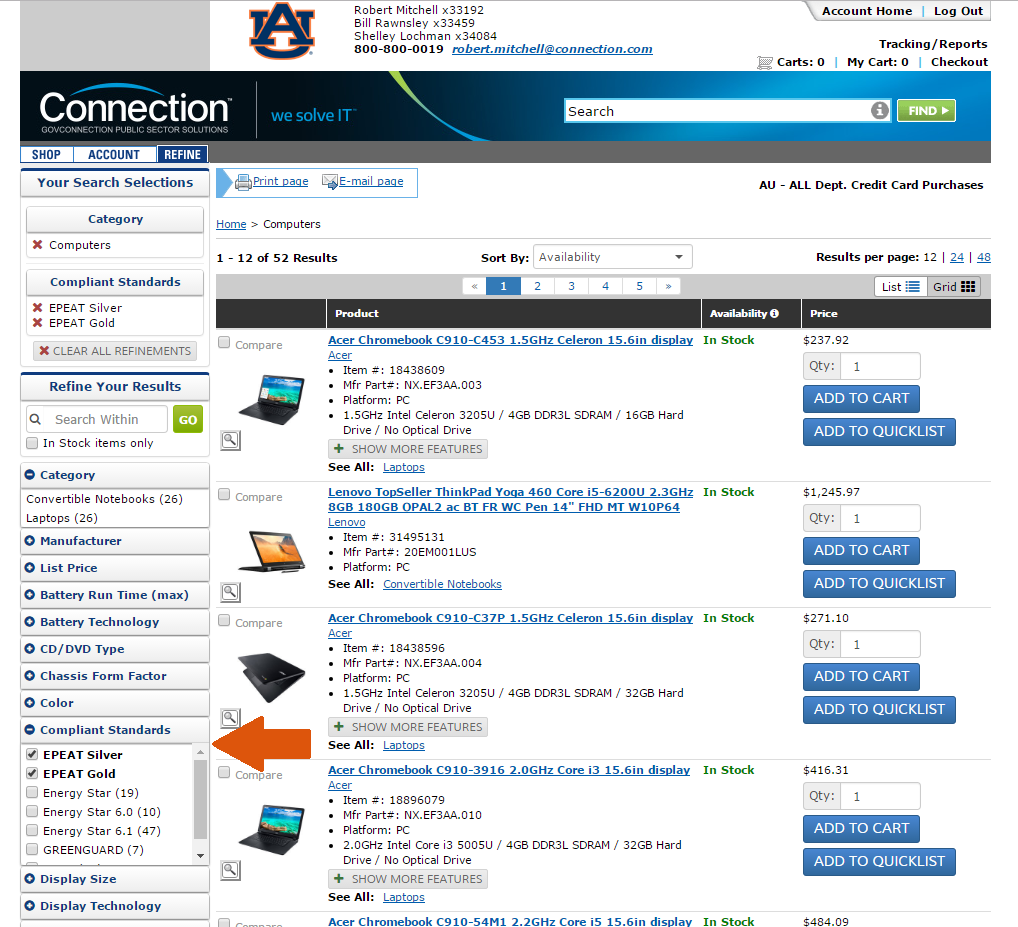
- Grainger
Grainger serves as the university’s preferred vendor for all maintenance, repair, and operations purchases. Once logged in to the Grainger site through Auburn’s portal, you will be able to filter for products with sustainability features one of two ways.
First, you can shop like you normally would for products, and simply use the “Shop By” filter section from the left-hand side of the page. Look to see if there are the following filters for the product you want to buy: “Green” and/or “Supplier Diversity.”
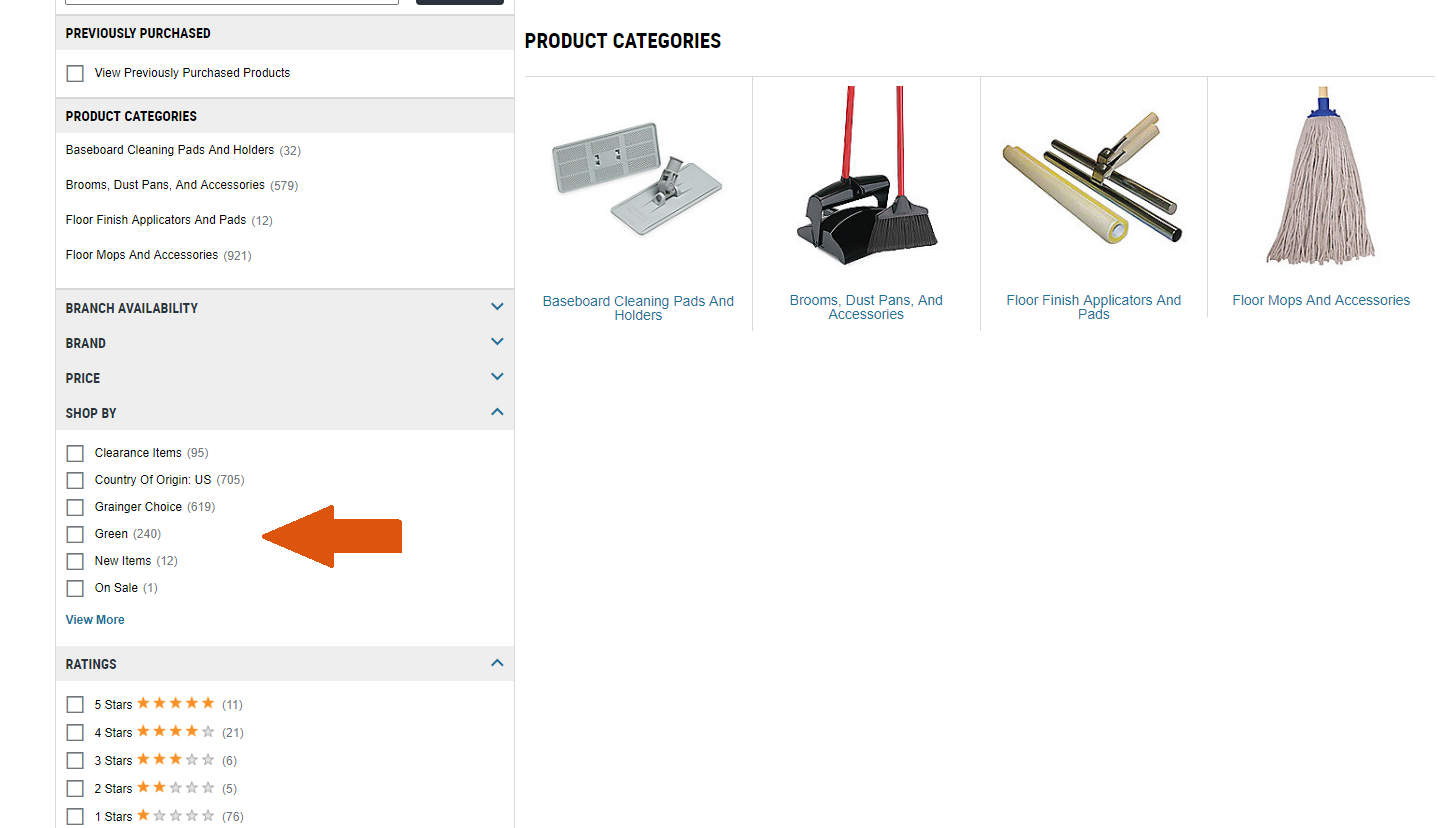
You can also scroll to the bottom of the login landing page, and simply click on the “Green” section. This will provide you with additional information on the selection of products available, how to the find them, features within product categories, and more.
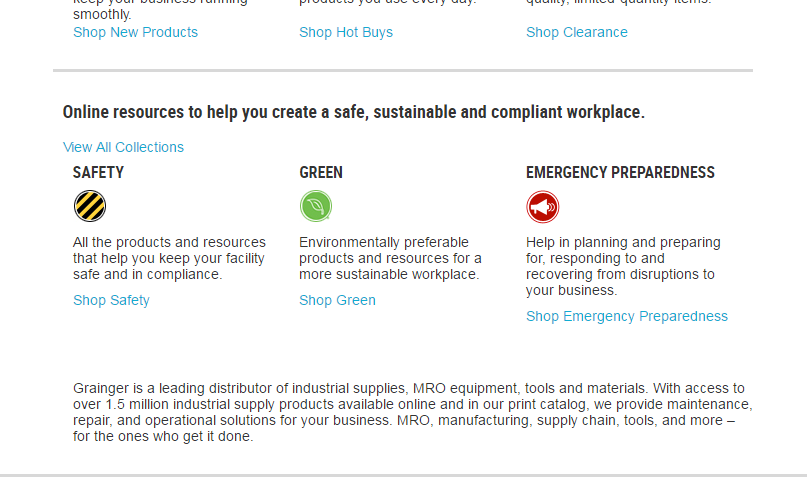
Working@AU Resources
For more information on how you can help Auburn save money and conserve resources via purchasing and other efforts, visit our Working @AU page. You’ll find key purchasing tips at the bottom of the page.



